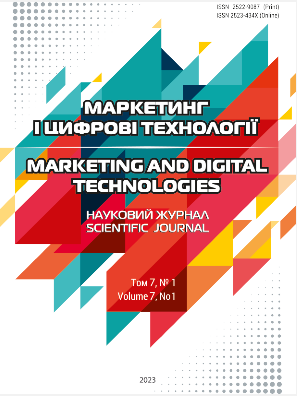The analysis of methodological approaches to the assessment of the efficiency of the enterprise’s marketing activity
Abstract
The aim of the article. The purpose of the article is the analysis and generalization of the approaches to grouping and stages of the forming process of the system of the effectiveness and efficiency indicators of the enterprise’s marketing activity.
Analyses results. The scientific community pays considerable attention to the study of financial aspects regarding the system formation of evaluating indicators of the enterprises’ marketing activity. Despite the sufficient interest paid to the problems of efficiency assessment by foreign and national marketing specialists there is no carefully structured system of the categories, methods and indicators that allow evaluating marketing activity. There are the approaches that recommend using only financial methods in evaluating the effectiveness of marketing activities, but in practice it has been proven that only the financial analysis is not enough to determine the effectiveness of marketing activities, since non-financial factors that also determine the financial effectiveness are neglected. Some scientists suggest using a general criterion of effectiveness to measure the effectiveness of marketing activities, namely, the ratio of the result of the company’s financial activity (provided that marketing services are functioning) to the costs of their maintenance. The group of non-financial indicators for evaluating the enterprises’ marketing activity is also very important. There are the following approaches: brand analysis, comparative analysis of the marketing complex, analysis of customer retention policy, customer lifetime value, model of predicting net income from the consumer relations, SCOR model. Such approaches can also include those that use a psychological component, which nowadays is very important regarding effectiveness evaluating of marketing activity. This article focuses, first of all, on the fact that it is necessary to clearly define the methodological principles on which the construction of the indicator system of marketing activity is based. Such an opinion is justified by the fact that when it becomes clear what principles the construction of the indicator system of marketing activity is based on and what requirements are put forward to this system, it is possible to proceed to detailing the process of evaluating the effectiveness of the enterprises’ marketing activity.
Conclusions and perspectives for further research. The conducted research showed that the scientific community did not reach the agreement on the issue of developing precise methodological bases for the systematic assessment of the effectiveness of marketing activities. However, there is also a positive trend which is expressed in the fact that the use of various methods of evaluating marketing activity allows to compare the degree of effectiveness of conducting marketing activities at the enterprise, as well as the need and feasibility of implementing certain marketing measures. Each of these methods has advantages and disadvantages and the choice depends on the choice of goals and appraisal object. However, the scientific community unanimously holds the opinion that the assessment of the effectiveness of the enterprises’ marketing activities of any industry is necessary first of all in order to substantiate the importance of marketing for the enterprise activity, regardless of the industry, and to be able to improve the marketing strategy.
In further developments in this area it is planned to rationalize and search for new methods and approaches for evaluating the effectiveness and contribution of marketing to the successful activity of enterprises.
Keywords: effectiveness, evaluation of effectiveness, marketing activity of the enterprise, systems of indicators, strategy, activity of the enterprise.
DOI: 10.15276/mdt.8.1.2023.12
- Tjeljetov O.S. (2004) Marketyngh u promyslovosti. K.: CUL, 33 p. (in Ukrainian).
- Kottler P. &Keller, K.L. (2007) Marketing Management. Praha, Grada Publishing. 792 p. (in English).
- Balabanova L.V., Folomkina I.S. (2009) Upravlinnja realizacijeju strateghij pidpryjemtsva: marketynghovyj pidkhid: monoghrafija. Donecjkyj nac. un. ekonomiky i torghivli im. Tughan-Baranovskogho. Donecjk. 402 p.
- Illjashenko S.M. (2010) Menedzhment ta marketyngh innovacij: monoghrafija. Sumy: Papirus. 624p.
- Ivanov Ju.B. (2014) Efektyvnistj marketynghovoji dijaljnosti pidpryjemstv v suchasnykh umovakh pidvyshhenoji dynamichnosti ta ryzykovanosti pidpryjemnyctva. EKONOMIKA:realiji chasu. #1(11) P. 155–159.
- V.M. Kobjeljev, Vasyljuk K.O. (2018) Metodychni pidkhody shhodo ocinky efektyvnisti marketynghovoji dijaljnosti pidpryjemstva. Visnyk NTU «KhPI». # 19(1295). p. 98–103
- Pokhabov V., Ponomarenko I. (2001) Metodyka ocinky systemy upravlinnja marketynghom na pidpryjemstvi. Marketyngh. Vol. 5. P. 102–120.
- Oklander, M.A. (2002) Problemy formuvannja marketynghovoji systemy krajiny. Kyjiv, 167 p.
- Oklander M. A. (ed.) (2017) Cyfrovyj marketyngh – modelj marketynghu KhKhI storichchja [Digital marketing - the model of marketing of the XXI century], Odesa: Astroprynt.
- Oklander M.A., Romanenko O.O. (2017) Specyfichni vidminnosti cyfrovogho marketynghu vid Internet-marketynghu [Specific differences in digital marketing from internet marketing]. Economic Bulletin Of National Technical University Of Ukraine «Kyiv Polytechnic Institute», no. 12, pp. 362– 371.
-
pdf_12 (Українська)
downloaded:




